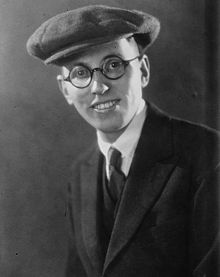Elmer Rice
| Elmer Rice | |
|---|---|

Elmer Rice ca. 1920
|
|
| Born | Elmer Leopold Reizenstein 28 September 1892 New York City, New York, US |
| Died | 8 May 1967 (aged 74) Southampton, Hampshire, England |
| Occupation | Playwright |
| Education | New York Law School |
| Spouse |
Betty Field (1942-1956) Hazel Levy (1915-1942) |
| Information | |
| Debut works |
On Trial (1914) The Home of the Free (1917) |
| Magnum opus | Street Scene |
| Awards | Pulitzer Prize for Drama (1929) |
Elmer Rice (born Elmer Leopold Reizenstein, September 28, 1892 – May 8, 1967) was an American playwright. He is best known for his plays The Adding Machine (1923) and his Pulitzer Prize-winning drama of New York tenement life, Street Scene (1929).
Rice was born Elmer Leopold Reizenstein at 127 East 90th Street in New York City, New York. His grandfather was a political activist in the Revolutions of 1848 in the German states. After the failure of that political upheaval, he emigrated to the United States where he became a businessman. He spent most of his retirement years living with the Rice family and developed a close relationship with his grandson Elmer, who became a politically motivated writer and shared his grandfather's liberal and pacifist politics. A staunch atheist, his grandfather may also have influenced Elmer in his feelings about religion as he refused to attend Hebrew school or to have a bar mitzvah. In contrast, Rice's relationship with father was very distant. As he wrote in his autobiography, his grandfather and his Uncle Will, both of whom boarded with the family, made up for the affection and attention his father withheld. A child of the tenements, Rice spent much of his youth reading, to his family's consternation, and later observed, "Nothing in my life has been more helpful than the simple act of joining the library."
Because of his need to support his family when his father's epilepsy worsened, Rice did not complete high school, and he took a number of menial jobs before earning his diploma by preparing for the state examinations on his own and then applying to law school. Though he disliked legal studies and spent a good deal of class time reading plays in class (because they could be finished within the span of a two-hour lecture, he said), Rice graduated from New York Law School in 1912 and began a short-lived legal career. Leaving the profession in 1914, he was always to retain a cynical outlook about lawyers, but his two years in a law office provided him with material for several plays, most notably Counsellor-at-Law. (1931). Courtroom dramas became a Rice specialty.
Needing to make a living, he decided to try writing full-time. It was a wise decision. His first play, On Trial, a melodramatic murder mystery, was a great success and ran for 365 performances. George M. Cohan offered to buy the rights for $30,000, a proposition Rice declined largely because he did not believe Cohan could be serious. Co-authored with a friend, Frank Harris (not the famed Oscar Wilde biographer and memoirist), the play was purportedly the first American drama to employ the technique of reverse-chronology, telling the story from its conclusion to its starting-point. On Trial then went on tour throughout the United States with three separate companies and was produced in Argentina, Austria, Canada, France, Germany, the Netherlands, Hungary, Ireland, Japan, Mexico, Norway, Scotland and South Africa. The author ultimately earned $100,000 from his first work for the stage. None of his later plays earned him as much as On Trial. The play was adapted for the cinema three times, in 1917, 1928, and 1939.
...
Wikipedia
